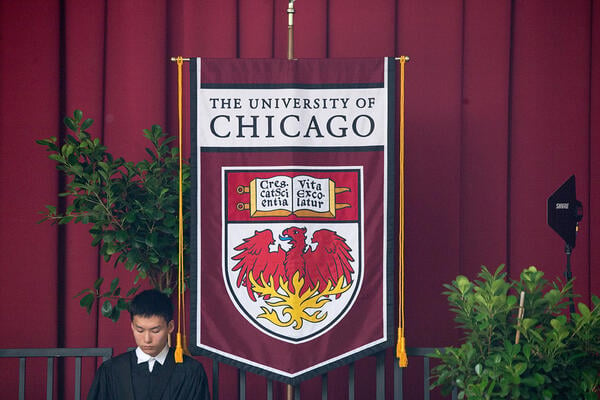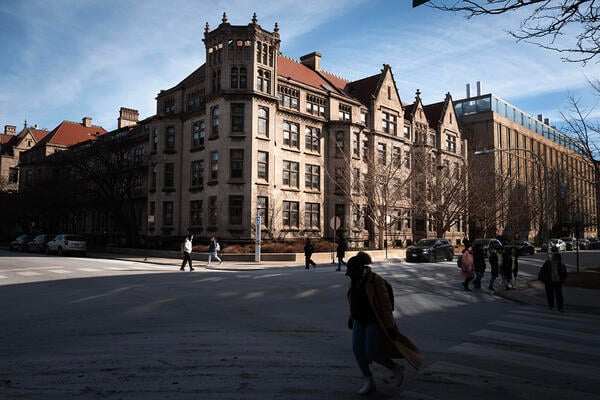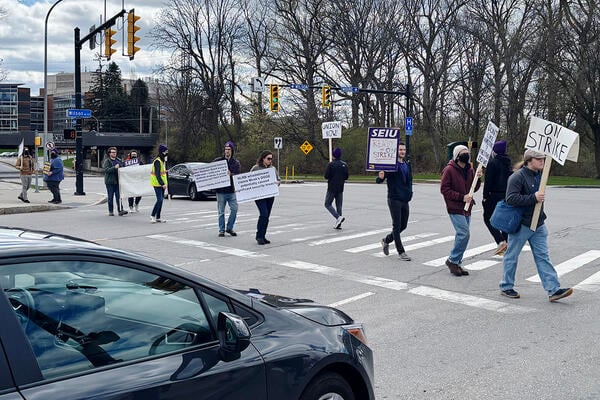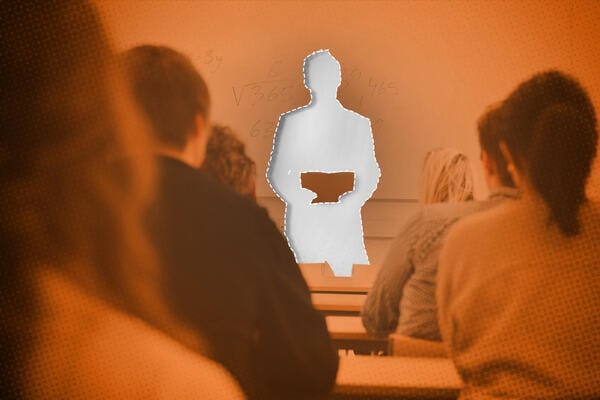Under mounting financial and political pressures, universities have paused or rescinded graduate student admissions on an unprecedented scale, which could create cross-campus ripple effects next fall and beyond.
The extent of the cuts to the graduate student workforce remains unclear and will vary from institution to institution. But if and when those losses come to pass, experts say that employing fewer graduate students—particularly Ph.D. students, who typically hold years-long research and teaching assistantships—will undermine universities’ broader operations, including undergraduate education, faculty support and the future of academic research, which is reliant on training the next generation of scholars.
“First and foremost, a reduction in the number of graduate students may threaten that individualized, close attention for undergraduates,” said Julia Kent, vice president of best practices and strategic initiatives at the Council of Graduate Schools.
That’s because many doctoral students work as teaching assistants, particularly for large introductory undergraduate courses, where they assist with grading, lead discussion sections, help students with assignments and supervise labs.
“While a professor may be doing the lectures for those courses, they may not seem as approachable or accessible to undergraduates. In those cases, the graduate teaching assistant is the first point of contact for that student. They may go to them for questions or feel more comfortable asking for help with assignment,” said Kent, who added that graduate students also support universities’ learning missions in other ways, too. “They may also help staff in the writing center and support undergraduates writing essays for their classes and provide informal mentoring.”
‘Not Sustainable’
Although colleges and universities haven’t felt the effects of losing a number of those roles yet, Kent said the uncertainty surrounding graduate admissions poses a “real risk” to undergraduate learning.
If universities do want to maintain smaller class sizes with fewer graduate students, they may rely even more heavily on low-paid contingent faculty, said Rosemary Perez, an associate professor at the Center for the Study of Higher and Postsecondary Education at the University of Michigan.
“That’s not sustainable for those instructors, who may be teaching five or six classes at multiple campuses and still not making enough to live,” she said. And with fewer graduate students in the pipeline, “we’ll also have fewer people who are trained to be faculty. People are going to retire. Who’s going to teach these college classes that have experience working with college students?”
Nothing concrete has to happen for people weighing their futures to decide to take a different path where it seems like there may be more stability. Rational humans may decide that’s not the direction they want to go in anymore, and that’s going to be an immediate loss to the field.”
—Marcel Agüeros, astronomy professor at Columbia University
And with fewer spots available to prospective graduate students, Perez fears students who don’t attend top-ranked institutions will be the first to disappear from the academic pipeline. That’s because when resources are scarce, “the tendency is to rely on markers of prestige or GRE scores as predictors of success,” she said. “But those aren’t great predictors of what people are capable of doing in their careers.”
Fewer graduate students will also likely mean a heavier workload for faculty, who in addition to teaching, also rely on them to help with research by assisting in running labs and research groups and co-authoring papers.
“They help universities’ reputation, but they also help faculty funding prospects by making the faculty more productive, because funding agencies like to see productive faculty. A lot of that labor is happening through graduate students,” said Julie Posselt, a higher education professor at the University of Southern California, which last month revoked outstanding offers for numerous Ph.D. programs, including sociology, chemistry, sociology, molecular biology and religion. “Meanwhile, there’s also plenty of evidence that Ph.D. students are contributing to universities’ research output and are independently advancing knowledge in their respective fields.”
Impact Will Reach All Fields
Already, numerous universities across the country have said they’re reducing the number of Ph.D. students in the biomedical sciences as a result of drastic cuts to the National Institutes of Health, which each year sends universities billions of dollars in grants that indirectly and directly support graduate education.
But it won’t just be those in the biomedical sciences that feel those cuts, especially as colleges downsize their budgets in light of the NIH’s plan to cap the amount of money it gives institutions for indirect research costs, which covers facilities maintenance, compliance with patient safety protocols and hazardous biowaste removal. Although a federal judge has blocked those cuts for now, the Department of Health and Human Services filed an appeal Monday; if the plan takes effect, it will force universities to find other areas they can cut from their budgets to make up the difference.
“Even if you’re in the humanities, what’s happening right now in federal granting agencies that are far from the humanities has an impact on the humanities, because the overall budget for a university to do things like keep up their infrastructure and keep the lights on will go down,” said Jody Greene, associate campus provost and literature professor at the University of California, Santa Cruz. “And if we also don’t have international students, that’s also going to be a significant budget hit at institutions like ours.”
International Students at Play
In addition to drastic cuts in grant funding from the NIH, the National Endowment for the Humanities and the Department of Education, the government has also revoked scores of international graduate students’ visas and detained several others.
U.S. Secretary of State Marco Rubio has characterized, with little concrete evidence, those students as “lunatics” who came to the United States “not just to study but to participate in movements that vandalize universities, harass students, take over buildings and cause chaos.” The administration is also considering a travel ban affecting 43 countries. (After Trump issued a travel ban for seven countries during his first term, the number of international applicants to U.S. colleges fell 5.5 percent for graduate students, though applications have been on the rebound post-pandemic.)
But universities worry that targeting international students—who made up nearly one in four incoming graduate students in 2022—will create a chilling effect, cause international student enrollment to plunge and strip institutions of yet another vital revenue source. According to data from the Institute of International Education, 81 percent of international undergraduate students and 61 percent of graduate students completely fund their own tuition.
Would-Be Ph.D.s Wary
All this politically driven chaos and financial uncertainty is making graduate school—and a career as a faculty member—a harder sell for students interested in research careers.
“Up until this year, we’ve been able to tell prospective graduate students that the university will cover the costs of their Ph.D.,” said Marcel Agüeros, an astronomy professor at Columbia University, where the Trump administration has frozen some $650 million in NIH funding. “We want to stay true to that commitment, but we’d be lying if we said that’s going to be 100 percent possible.”
And even though his department is currently only expecting to offer one fewer Ph.D. slot, Agüeros said the uncertainty over the future of federal funding—and even what areas of research academics are allowed to pursue—is enough to push people out of academia.
“Nothing concrete has to happen for people weighing their futures to decide to take a different path where it seems like there may be more stability,” he said. “Rational humans may decide that’s not the direction they want to go in anymore, and that’s going to be an immediate loss to the field.”
And those are the questions would-be graduate students all over the country are asking themselves right now.
“We don’t have any data yet, but anecdotally, I’m hearing that there are a ton of students who are choosing not to even try to go to graduate school this year and next year because they’re perceiving less funding and support,” said Bethany Usher, immediate past president of the Council on Undergraduate Research and provost at Radford University in Virginia.
“Those Ph.D. students are the ones who push the boundaries of research,” she added. “They have the newest ideas, and if we reduce those, it will have a generational impact on higher education, industries and communities.”





